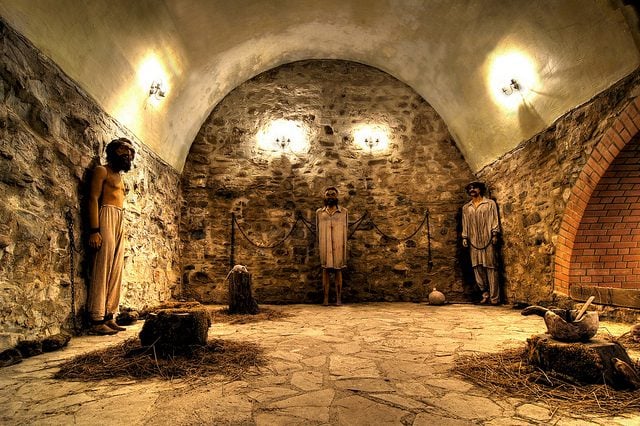Year B — Proper 21 — Mark 9:38-50
If your hand causes you to stumble, cut it off; it is better for you to enter life maimed than to have two hands and to go to hell, to the unquenchable fire. — Jesus
Like many who grew up in the evangelical Protestant church, I lived out my faith as a young man with a Bible in one hand and an ax in the other.
My tradition taught me that faith was primarily about avoiding temptation, resisting sin and secularity, and escaping divine punishment and wrath. In short, I learned to reduce my relationship with God to a transaction that provided me with divine fire insurance.
For me as a teenager, this played out in few very vivid ways. For instance, when I was 17, I decided to give away my entire 90s rock music collection so I would no longer be tempted by its swear words and sexual innuendo and so that I could listen exclusively to Christian music. While this was a rite of passage of many evangelicals of my era, my friends thought I had lost my mind. But they didn’t protest too much when I was handing out Metallica CDs like Halloween candy.
Less comically, though, was the time I broke up with my first serious girlfriend because she didn’t feel comfortable praying with me or adding a spiritual component to our high school relationship. As I came to find out later, she was the wiser of the two of us, but it took several years to realize that. By that time, I had already hacked and cut away at my life, my friendships, and even my choices of colleges, all in the name of God and avoiding temptation.
What I didn’t realize at the time, however, was that as I was whittling down my potential temptations I was also whittling down, narrowing and shrinking my understanding of God. God hadn’t just become small, but small-minded, whose primary power lay in the threat of punishment rather than the empowering movement of love and grace.
Faith and spirituality became about the rules, about right and wrong, about who was in and who was out, who was going to be rewarded by God and who was going to be punished.
Of course, these concerns are not uniquely those of an evangelical or even of a young person. In fact, this philosophy cuts across all Christian denominations, including our own. We see these same concerns crop up in discussions in the Anglican Communion over marriage equality, over the authority of the Bible, and over the proper use of the prayer book and its rites.
No surprise, then, we find these concerns in the gospel, too. In fact, these themes run through our gospel text today, themes of reward and punishment expressed by Jesus, and concerns of belonging and exclusion expressed by the disciples.
The disciples were worried about who was in and who was out, who belonged and who didn’t. They seemed more concerned whether these things — even great miraculous things — were being done in the right and proper way than they were about the work of God to heal the world in love.
See, prior to this conversation, the disciples had been unable to cast out an evil spirit. And apparently, between that failure and today’s text, they had witnessed an unnamed healer cast out a spirit in Jesus’ name even though he wasn’t a part of the disciples. But instead of approaching the healer in gratitude and celebration that, y’know, someone had been healed and made whole or even that their movement of God’s kingdom was expanding beyond their tiny group, they put a stop to it and forbid him from doing any other miracles.
You can almost see Jesus shaking his head in frustration when he explains that it’s actually good when people are healed from sickness and even better when they are doing it in his name!
It seems the disciples have clearly missed the point again, so Jesus offers them two exaggerated and hyperbolic scenarios for understanding what the life of faith is really all about.
On the one hand, Jesus explains that if anyone offers a cup of cold water to a little one their divine reward is assured. On the other, Jesus explains that if we’re to avoid punishment, we should cut off whatever body part causes our temptation. Instead of an eye for an eye, Jesus seems to be advocating an eye for a sin.
Now, we understand we aren’t supposed to take these saying literally. They are obviously exaggerations, both the cup of cold water and the self-mutilation. Otherwise, none of us would have eyes and probably not many limbs between us. We most certainly wouldn’t have any tongues left, but that might not be such a bad thing because it would mean you wouldn’t have to listen to any more sermons.
But I do think Jesus is saying something profoundly important about the way we understand faith.
Notice how ridiculously high the bar is when faith is centered in the avoidance of punishment and sin and the pursuit of a perfect life without sin. You’ll have to cut off parts of your body, pluck out your eyes, and disfigure yourself. Essentially, Jesus is saying if you want a perfect life, the only way you will be able to do that is to incapacitate yourself completely, to go through life so mutilated and so maimed you literally can’t do anything but exist.
Seeking perfection will cost you everything, in other words.
Now, notice on the other hand how ridiculously low the bar is when faith is centered in acts of generosity. One cup of cold water. That’s it. One cup is enough for an eternal reward.
Jesus lays before the disciples two options: the way of perfection and punishment with its impossibly high standards or the way of generosity and reward with its comically low standards.
 The way of the cold water and the way of the ax. One cuts and divides, maims and kills. The other cleanses and revives, refreshes and gives life.
The way of the cold water and the way of the ax. One cuts and divides, maims and kills. The other cleanses and revives, refreshes and gives life.
Even today, the Christian faith disagrees on which way God would have us live. Some Christians understand it as a holy mission to hack and chop away at what they consider sinful. Others believe God calls us to offer cold water to a world thirsty for healing, for grace, and for generosity.
To be honest, both are completely orthodox positions. Both are represented by the historic faith. Both have strong support within the biblical narrative. So as with most theological questions, it comes down to who you think God really is and what God is really all about.
If we follow the way of the ax, centering our faith in the avoidance of punishment and sin, we are also basing it in the unspoken belief that we deserve to be punished. The philosophy of the ax believes that when something fails or goes wrong someone has to be blamed and someone has to pay. It holds to this retaliatory notion of a God that looks at us, demands perfection and, when we inevitably fall short, responds with punishment.
The way of the cold water, however, rests on the belief that God loves us, reaches out to us in relationship, and when we inevitably fall short and grow thirsty, offers us not punishment but water, the cold waters of life to revive us.
So we can spend our lives being exceptionally and unreasonably hard on ourselves, hacking away at our lives in hopes of avoiding sin and punishment. Or we can spend our lives by being extraordinarily and abundantly generous with each other and with ourselves.
We can look at the world around us, fractured by suffering and hate, and reach for the ax believing ourselves to be on a holy mission to eradicate sin, to shrink our worlds so that it is only us and those like us in it. But history tells us we will only add more suffering and brokenness to the world.
Or we can reach for the cup of cold water. We can respond with generosity and grace to all, to give life to others and in the process give life to ourselves.
What does the world need most: another cup of cold water or another ax?
We’ve seen what it looks like when we take an ax to the world. In fact, it frequently seems to be the philosophy of the ax that creates the need for a cup of cold water. War and violence in the Middle East, in Iraq and Syria, hacked away at the stability of the region and has led directly to the mass exodus of Syrian refugees who today are in desperate need of a cup of cold water from the world. In this country, African American families have been hacked apart by policies of mass incarceration and economic injustice. In states around the country, education and social service budgets serving the little ones, the least of these, have been systematically hacked away to say nothing of what’s happening to voting rights.
What does a cup of cold water look like to one of the millions of Syrian refugees?
What does a cup of cold water look like to the African American community that has been disproportionately targeted for arrested and incarcerated?
What does a cup of cold water look like in your state? Your county or city?
In your church?
In your family?
You know, maybe it’s not hyperbole after all, this business about a cup of cold water. After all in our tradition, water holds special significance. When a cup of cold water is poured over a child’s head in baptism, it marks us a God’s beloved, part of God’s eternal family. Jesus at the well offers the woman a cup of cold water, living water that will quench thirst forever. Maybe offering a cup of cold water really is all it takes.
And maybe, just maybe, that one cup of cold water is enough to bathe the world, or at least a small part of it, with the perfect love of God.
 Image Credit: Jar — Michael W. May, Ice Cubes: Patrick Brosset, Axes — Coconicoco (Flickr)
Image Credit: Jar — Michael W. May, Ice Cubes: Patrick Brosset, Axes — Coconicoco (Flickr)
















